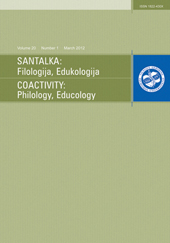Didžiausi taisyklingos tarties kliuviniai: lietuviams mokantis ispanų kalbos ir ispanams mokantis lietuvių kalbos
The Major Obstacles of Correct Pronunciation: For Lithuanians Learning Spanish and for Spanish Learning Lithuanian
Author(s): Loreta Alešiūnaitė, Laura Raščiauskaitė, Inga PapšytėSubject(s): Language and Literature Studies
Published by: Vilnius Gediminas Technical University
Keywords: articulation; consonants; letter; Lithuanian language; phoneme; phonetics; pronouncing; Spanish language; vowels
Summary/Abstract: When a person starts learning a new foreign language and tries to speak to a native speaker, it is a common situation when he/she is asked to repeat (sometimes more than once) because the listener does not understand the speaker‘s pronunciation. As a consequence, the speaker’s confidence in his/her language competence is shaken as well as motivation for the use of this foreign language. This situation shows the importance of correct pronunciation which is one of the significant components of successful foreign language learning. Recently, the learning of Spanish and Lithuanian as foreign languages has become increasingly popular in Kaunas. From 2009 a quarter of LUHS foreign students are Spanish students, and Spanish is the first most chosen from 26 of those taught as a second foreign language at VMU. During the analysis of Spanish and Lithuanian phonetic similarities and differences, the main purpose is to discuss, compare and identify the major obstacles in pronunciation for Lithuanians learning Spanish and for Spanish students learning Lithuanian. The experimental mirror principle reveals the main obstacles to correct pronunciation which indicate the cases where Spanish students make pronunciation mistakes in the Lithuanian language, and, respectively, those cases are the same where the pronunciation obstacles for Lithuanians speaking Spanish arise. Learning of phonetics is one of the most important parts of communicative competence – that is why it is recommended to pay attention to the orthoepy in foreign languages and begin to develop pronunciation from the very first levels of language learning, because the positive results appear in the long run and after much practice.
Journal: Santalka: Filologija, Edukologija
- Issue Year: 20/2012
- Issue No: 1
- Page Range: 5-17
- Page Count: 13
- Language: Lithuanian

